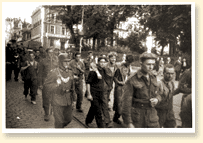

Canadian soldiers taken prisoner by the Germans at Dieppe. |
Dieppe Raid, 19 August 1942
Five thousand troops of the 2nd Canadian Infantry , along with a thousand British troops, many of them ,
attacked the
French port of Dieppe on the English Channel Coast in August 1942.
Led by Major-General J. H. Roberts, the force was supported by ships
of the Royal Navy and aircraft of the and RCAF. The purpose was
to make a successful raid on German-occupied Europe over water, and
then to hold Dieppe briefly. The results were disastrous.
The German defences were on the alert. The main Canadian landing on
the Dieppe beach and flanking attacks at Puys and Pourville failed
to reach any of their objectives. Only the enjoyed any
success.
After nine hours fighting ashore, the force withdrew. Over one
thousand were dead and two thousand prisoners were in German hands,
more prisoners than the whole Canadian Army lost in either the North
West Europe or Italian campaigns. The Royal Hamilton Light Infantry,
largely made up of soldiers from the Hamilton area, had taken 582
soldiers into the thick of the fighting. 197 of them were killed or
died as prisoners and 175 became prisoners of war. Many of the
prisoners and many of those who got back to England were wounded.
Two Canadians received the Victoria Cross for their bravery.
In the air above the landings, the waged its most intense air
battle on a single day in the whole war. The lost 106 aircraft
(including thirteen machines and ten pilots), and the Germans
48 aircraft.
Behind the failure lay a poor, overly complex plan, insufficient
fire support from aircraft and artillery, and inadequate training of
troops for their first test of battle. Yet lessons were learned for
later amphibious landings in the Mediterranean and at Normandy.
Related Newspaper Articles
English Articles
- Land With Tanks, Heavy Weapons; Wage Fierce Fight With Boches
In Dynamic Dieppe Area Attack
The Hamilton Spectator, 19/08/1942
- Every Fighter Unit of RCAF Employed Supporting Attack
The Globe and Mail, 20/08/1942
- One Brother Is Killed, Two Missing at Dieppe
The Globe and Mail, 24/08/1942
- Men of Valor : They Fight For You
The Globe and Mail, 18/03/1943
- Why Sugar the Pill?
The Globe and Mail, 27/04/1943
- First Full Exposition of Dieppe Raid Given
The Globe and Mail, 18/05/1943
- Modest Chaplain Thinks Heroism Ordinary Work
The Hamilton Spectator, 12/02/1946
- Important New Details on Dieppe Raid Revealed
The Hamilton Spectator, 03/05/1948
French Articles
-
Puissante attaque des troupes canadiennes sur Dieppe
Le Devoir, 19/08/1942
-
Les détails sont encore rates sur le raid contre Dieppe
Le Devoir, 20/08/1942
-
On prédit de nouveaux débarquements en territoire occupé. Rude coup porté aux Allemands...
Le Devoir, 20/08/1942
-
L'atterissage alliés à Dieppe
Le Devoir, 20/08/1942
-
"On craint que les pertes canadiennes n'aient été élevées, à Dieppe. On attend ici la listes, surtout des Fusiliers Mont-Royal"
Le Devoir, 21/08/1942
-
"L'exploit de Dieppe. Première liste de ""disparus"" et de blessés"
Le Devoir, 21/08/1942
-
L'exploit de Dieppe. Les Fusiliers Mont-Royal ont joué un rôle de premier plan
Le Devoir, 21/08/1942
-
"""Nous ne sommes pas pour rester tranquilles"" Le général McNaughton commente la leçon de Dieppe..."
Le Devoir, 28/08/1942
-
Comment nos Canadiens ont tué des Allemands au siège de Dieppe
Le Devoir, 28/08/1942
-
Les victimes de Dieppe sont un exemple du devoir et de l'héroïsme
Le Devoir, 02/09/1942
-
Le raid de Dieppe. Causerie d'un journaliste qui en fut témoin
Le Devoir, 05/09/1942
-
M. Churchill parle de l'expédition des troupes canadienne à Dieppe
Le Devoir, 08/09/1942
-
Après Dieppe. Les changements apportés dans le commandement de deux divisions canandiennes à la suite de l'attaque de Dieppe
Le Devoir, 10/09/1942
-
Nouvelles de guerre. Relation de M. Ralston sur les opérations de Dieppe
Le Devoir, 18/09/1942
-
"Les pertes, à Dieppe, ont été de près de la moitié du total des envahisseurs. "
Le Devoir, 30/09/1942
-
La stratégie suivis à Dieppe
Le Devoir, 26/02/1943
-
Le coup de Dieppe
Le Devoir, 03/11/1943
-
L'attaque sur Dieppe
Le Devoir, 08/04/1943
-
Outremont a célébré hier l'héroîsme de ses fils
Le Devoir, 14/06/1943
-
Des Canadiens de Dieppe sont en route vers Montréal
Le Devoir, 25/11/1943
|